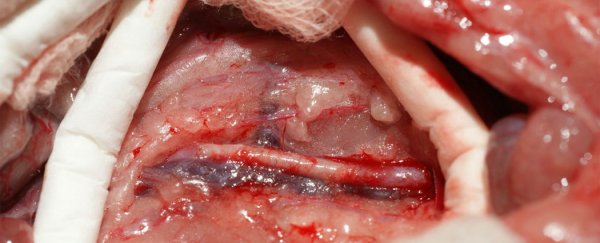Scientists in Austria have managed to create biodegradable blood vessels using a unique polymer material that could one day replace the need for patients to donate their own blood vessels when undergoing lifesaving bypass surgery.
The team reports that when transplanted into mice, the blood vessels were perfectly functional, and over time were naturally broken down and replaced by their own blood vessels. If replicated in humans, these artificial blood vessels would make a huge difference in how arteriosclerotic vascular disorders - the leading cause of heart attacks, stroke, and peripheral vascular disease - are treated.
Made from elastomer, which is a special type of polymer that displays viscoelasticity - the quality of having both viscosity and elasticity - these artificial blood vessels are produced by spinning polymer solutions in an electrical field to form very fine threads of elastomer that are wound onto a spool. This allows the scientists to create strong but delicate vessel walls that are very similar to those of natural blood vessels.
As the elastomer material is slightly porous, tiny amounts of blood are able to seep through to strengthen and enrich the structure of the walls. "By selecting very specific molecular building blocks we have succeeded in synthesising a polymer with the desired properties," one of the team, Robert Liska from Vienna University of Technology's Institute of Applied Synthetic Chemistry, told James Temperton at Wired UK.
Heart disease is the most common cause of death in the developed world, and is caused by the thickening of the artery wall due to blockage from a build up of white blood cells. The only way to cure this is bypass surgery, which involves extracting healthy blood vessels from somewhere else in the patient's body, and using them to replace the blocked ones.
Obviously this isn't ideal, and researchers have been trying to figure out how to make artificial blood vessels that are as finely constructed as the real thing, so future blockages don't occur. The team in Austria are confident that their new blood vessels will fit the bill. "This latest breakthrough could allow surgeons to carry out more bypass operations and reduce the risk of blockages associated with smaller artificial blood vessels," Temperton says. "Experiments with rats have already proven successful and researchers are confident the technique could be carried over to humans."
The results were published in the journal Acta Biomaterialia.
"The rats' blood vessels were examined six months after insertion of the vascular prostheses," one of the team, Helga Bergmeister from the Medical University of Vienna, said in a press release. "We did not find any aneurysms, thromboses or inflammation."
The next step will be to try these artificial blood cells out in preclinical human trials. It's too soon to get excited about the potential of these little blood vessels, but if they do live up to their potential, they could do some truly amazing things for a whole lot of people.
Source: Wired UK
